Operator associations in the Netherlands
Page 154
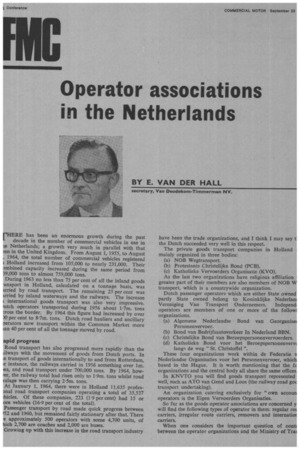
Page 155
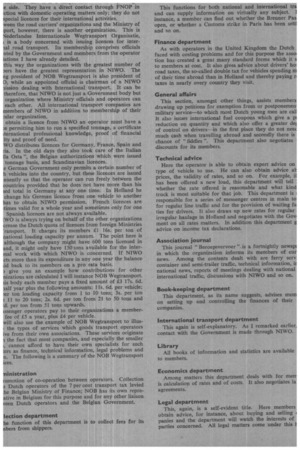
Page 156
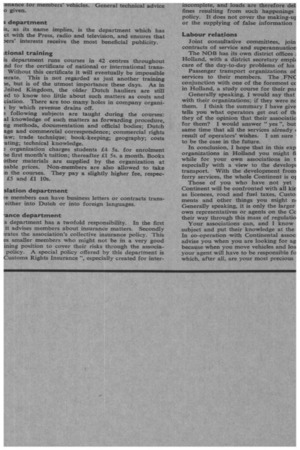
Page 158
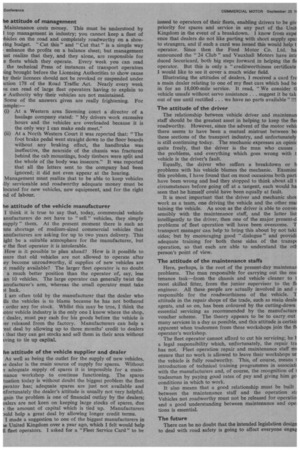
Page 159
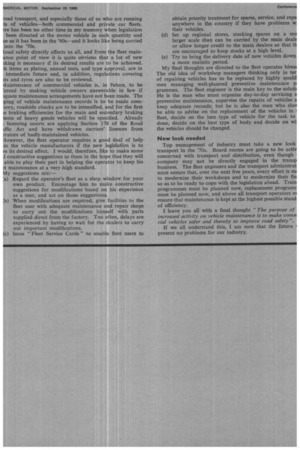
If you've noticed an error in this article please click here to report it so we can fix it.
BY E. VAN DER HALL
secretary, Van Deudekom-Timmerman NV.
['HERE has been an enormous growth during the past decade in the number of commercial vehicles in use in ie Netherlands; a growth very much in parallel with that !en in the United Kingdom. From August 1, 1955, to August , 1964, the total number of commercial vehicles registered Holland increased from 105,000 to nearly 231,000. Their 3mbined capacity increased during the same period from 39,000 tons to almost 759,000 tons.
During 1963 no less than 75 per cent of all the inland goods .ansport in Holland, calculated on a tonnage basis, was Irried by road transport. The remaining 25 per cent was trried by inland waterways and the railways. The increase
L international goods transport was also very impressive. Iutch operators transported during 1956 about 1-7m. tons zoss the border. By 1964 this figure had increased by over )0 per cent to 8.7m. tons, Dutch road hauliers and ancillary perators now transport within the Common Market more Lan 40 per cent of all the tonnage moved by road.
apid progress
Road transport has also progressed more rapidly than the Lilways with the movement of goods from Dutch ports. In .e transport of goods internationally to and from Rotterdam, 1r instance, the railways carried in 1956 something over lm. cs, and road transport under 700,000 tons. By 1964, howrer, the railway total had risen only to 1-9m. tons whilst road tulage was then carrying 2-5m. tons.
At January 1, 1964, there were in Holland 11,635 profes3nal road transport companies operating a total of 35,537 !hides. Of these companies, 223 (1.9 per cent) had 15 or ore vehicles (16.9 per cent of the total).
Passenger transport by road made quick progress between 152 and 1960, but remained fairly stationary after that. There e approximately 500 operators with some 4,700 units, of hich 2,700 are coaches and 2,000 are buses.
Growing up with this increase in the road transport industry have been the trade organizations, and I think I may say t the Dutch succeeded very well in this respect.
The private goods transport companies in Holland mainly organized in three bodies: (a) NOB Wegtransport.
(b) Protestants Christelijke Bond (PCB).
(c) Katholieke Vervoerders Organisatic (KVO).
As the last two organizations have religious affiliation • greater part of their members are also members of NOB W transport, which is a countrywide organization.
Dutch passenger operators which are either State owned partly State owned belong to Koninklijke Neder1an4 Vereniging Van Transport Ondernemcrs. Independ operators are members of one or more of the followi organizations.
(a) Algemene Nederlandse Bond van Georganisei Personcnvervoer.
(b) Bond van Bedrijfsautoverkeer In Nederland BBN.
(c) Christelijke Bond van Beroepspersonenvervoerders.
(d) Katholieke Bond voor het 13eroepspersonenverv( langq de weg "St. Christoffel ".
These four organizations work within de Federatie v Nederlandse Organisatics voor het Personenvervoer, which based in the Hague. It is worth mentioning that the fc organizations and the central body all share the same offices.
In KNVTO you will find goods transport represented well, such as ATO van Gend and Loos (the railway road goc transport undertaking).
An organization catering exclusively for "own accoun operators is the Eigen Vervoerders Organisaties.
So far as the goods operator associations are concerned y will find the following types of operator in them: regular rot carriers, irregular route carriers, removers and internatiot carriers.
When one considers the important question of cont between the operator organizations and the Ministry of Trat
e side. They have a direct contact through FNOP in !ction with domestic operating matters only; they do not special licences for their international activities.
we-en the road carriers' organizations and the Ministry of port, however, there is another organization. This is Nederlandse Internationale Wegtransport Organisatie, I is a body concerned with issuing licences for interaal road transport. Its membership comprises officials nted by the Government and members from the operator iations I have already detailed.
this way the organizations with the greatest number of Jers have the greatest representation in NIWO. The ng president of NOB Wegtransport is also president of 0, while an appointed official is chairman of a NIWO aission dealing with international transport. It can be therefore, that NIWO is not just a Government body but organization where Ministry officials and operators can each other. All international transport companies are members of NIWO in addition to membership of their .:ular organization.
obtain a licence from NIWO an operator must have a t7e permitting him to run a specified tonnage, a certificate iternational professional knowledge, proof of financial ity and proof of need.
WO distributes licences for Germany, France, Spain and ria. In the old days they also took care of the Italian lla Osta ", the Belgian authorizations which were issued tonnage basis, and Scandinavian licences.
e German Government only permits a certain number of h vehicles into the country, but these licences are issued anently so that the operator can run freely between the countries provided that he does not have more than his sed total in Germany at any one time. In Holland he change his German licence from one vehicle to another has to obtain NIWO permission. French licences are times valid for a whole year and sometimes only for one Spanish licences are not always available.
:WO is always trying on behalf of the other organizations crease the Dutch quota of licences from foreign Ministries 'ransport. It charges its members £1 16s. per ton of national loading capacity per annum. The point here is although the company might have 600 tons licensed in and, it might only have 150 tons available for the internal work with which NIWO is concerned. If NIWO cts more than its expenditure in any one year the balance Lid back to its members on a pro rata basis.
) give you an example how contributions for other nizations are calculated 1 will instance NOB Wegtransport. us body each member pays a fixed amount of £3 17s. 6d. lalf year plus the following amounts: 11 s. 6d. per vehicle; )er ton loading capacity from 1 to 10 tons; 3s. per ton 1 11 to 20 tons; 2s. 6d. per ton from 21 to 50 tons and :d. per ton from 51 tons upwards.
tssenger operators pay to their organizations a memberfee of £5 a year, plus £4 per vehicle.
will also use the example of NOB Wegtransport to Him; the types of services which goods transport operators ive from their own associations. These services originate the fact that most companies, and especially the smaller ;, cannot afford to have their own specialists for such ters as finance, technical information, legal problems and n. The following is a summary of the NOB Wegtransport ices.
ninistration romotion of co-operation between operators. Collection a Dutch operators of the 7 per cent transport tax levied he Belgian Ministry of Finance; NOB has its own repreative in Belgium for this purpose and for any other liaison veen Dutch operators and the Belgian Government.
lection department he function of this department is to collect fees for its nbers from shippers. This functions for both national and international tra and can supply information on virtually any subject. 1 instance, a member can find out whether the Brenner Pas; open, or whether a Customs strike in Paris has been settl and so on.
Finance department As with operators in the United Kingdom the Dutch faced with costing problems and for this purpose the assol tion has created a great many standard forms which it s to members at cost. It also gives advice about drivers' ho: road taxes, the so-called double tax for vehicles spending m of their time abroad than in Holland and thereby paying taxes in nearly overy country they visit.
General affairs
This section, amongst other things, assists members drawing up petitions for exemption from or postponemen. military service—to which most Dutch young men are call It also issues international fuel coupons which give a p1 reduction on quantity and which also offer a greater del of control on drivers—in the first place they do not neec much cash when travelling abroad and secondly there is chance of "fiddles ". This department also negotiates discounts for its members.
Technical advice
Here the operator is able to obtain expert advice on type of vehicle to use. He can also obtain advice ah prices, the validity of rates, and so on. For example, if has been offered a new load, this department will tell : whether the rate offered is reasonable and what kind truck is most suitable for that job. This department is ; responsible for a series of messenger centres in main to for regular line traffic and for the provision of waiting fa ties for drivers. It also draws up new rates for regular irregular haulage in Holland and negotiates with the Gov, ment on all rates matters. In addition this department g advice on income tax declarations.
Association journal This journal " Beroepsvervoer "is a fortnightly newscq in which the organization informs its members of cur news. Among the contents dealt with are ferry serv container and semi-trailer traffic, technical information, it national news, reports of meetings dealing with national international traffic, discussions with NIWO and so on.
Book-keeping department This department, as its name suggests, advises mem on setting up and controlling the finances of their companies.
International transport department This again is self-explanatory. As I remarked earlier, contact with the Government is made through NIWO.
Library All books of information and statistics are available to members.
Economics department Among matters this department deals with for merr is calculation of rates and of costs. It also negotiates la agreements.
Legal department
This, again, is a self-evident title. Here members obtain advice, for instance, about buying and selling panies and the department will watch the interests of parties concerned. All legal matters come under this 1 :enance tor members' vehicles. General technical advice o given.
s department
is, as its name implies, is the department which has ct with the Press, radio and television, and ensures that 3ers' interests receive the most beneficial publicity.
tional training
is department runs courses in 42 centres throughout nd for the certificate of national or international transWithout this certificate it will eventually be impossible mrate. This is not regarded as just another training le, but is of the utmost importance these days. As in Jnited Kingdom, the older Dutch hauliers are still ed to know too little about such matters as costs and ciation. There are too many holes in company organi by which revenue drains off.
! following subjects are taught during the courses: al knowledge of such matters as forwarding procedure, ng methods, documentation and official bodies; Dutch age and commercial correspondence; commercial rights law; trade technique; book-keeping; geography; costs .ating; technical knowledge.
organization charges students £4 5s. for enrolment he first month's tuition; thereafter £1 5s. a month. Books other materials are supplied by the organization at cable prices. Non-members are also allowed to take n the courses. They pay a slightly higher fee, respec£5 and I I0s.
slation department
re members can have business letters or contracts transeither into Dutch or into foreign languages.
'once department
s department has a twofold responsibility. In the first it advises members about insurance matters. Secondly :rates the association's collective insurance policy. This es smaller members who might not be in a very good ining position to cover their risks through the associapolicy. A special policy offered by this department is Customs Rights Insurance ", especially created for inter incomplete, and loads are therefore del fines resulting from such happenings policy. It does not cover the making-ur or the supplying of false information
Labour relations
Joint consultative committees, join contracts of service and superannuation The NOB has its own district offices Holland, with a district secretary emph care of the day-to-day problems of his Passenger transport organizations of services to their members. The FNC conjunction with one of the foremost cc in Holland, a study course for their par Generally speaking, I would say that with their organizations; if they were nc them. I think the summary I have give tells you what operators get out of th they of the opinion that their associatia for them? I would answer " yes ", but same time that all the services already result of operators' wishes. I am sure • to be the case in the future.
In conclusion, I hope that in this exp organizations in Holland you might fi while for your own associations in t especially with a view to the develop] transport. With the development from ferry services, the whole Continent is or Those of you who have not yet Continent will be confronted with all kir as licences, road and fuel taxes, Costa meats and other things you might it, Generally speaking, it is only the larger own representatives or agents on the Cc their way through this mass of regulatio Your associations can, and I know subject and put their knowledge at the In co-operation with Continental assoc advise you when you are looking for ag because when you move vehicles and loa your agent will have to be responsible fo which, after all, are your most precious
he attitude of management
Maintenance costs money. This must be understood by 1 top management in industry; you cannot keep a fleet of !hides on the road and completely roadworthy on a shoering budget. "Cut this" and "Cut that" is a simple way , enhance the profits on a balance sheet; but management ust realize that they, and they alone, are responsible for .e fleets which they operate. Every week you can read the technical Press of instances of transport operators ;bag brought before the Licensing Authorities to show cause hy their licences should not be revoked or suspended under =don 178 of the Road Traffic Act. Nearly every week iii can read of large fleet operators having to explain to .e Authority why their vehicles are not maintained.
Some of the answers given are really frightening. For . :ample:— (i) At a Western area licensing court a director of a haulage company stated: "My drivers work excessive hours and the vehicles are overloaded because it is the only way I can make ends meet."
(ii) At a North Western Court it was reported that: "The foot brake pedal went straight down to the floor boards without any braking effect, the handbrake was , ineffective, the nearside of the chassis was fractured i behind the cab mountings, body timbers were split and i the whole of the body was insecure." It was reported . that all the letters sent to the company had been ignored; it did not even appear at the hearing. anagement must realize that to be able to keep vehicles [Hy serviceable and roadworthy adequate money must be located for new vehicles, new equipment, and for the right nd of labour.
he attitude of the vehicle manufacturer
I think it is true to say that, today, commercial vehicle anufacturers do not have to " sell " vehicles, they simply supply" them. At the present moment there is such an aite shortage of medium-sized commercial vehicles that anufacturers are asking for up to two years delivery. This ight be a suitable atmosphere for the manufacturer, but ir the fleet operator it is intolerable.
How is it possible to plan ahead? How is it possible to isure that old vehicles are not allowed to operate after ey become unroadworthy, if supplies of new vehicles are 3t readily available? The larger fleet operator is no doubt • a much better position than the operator of, say, less an 10 vehicles. The large operator can generally twist the anufacturer's arm, whereas the small operator must take A hick.
I am often told by the manufacturer that the dealer who Os the vehicles is to blame because he has not bothered I order any for stock. Whilst this may be true, I think the lotor vehicle industry is the only one I know where the shop, r dealer, must pay cash for his goods before the vehicle is Ter released from the factory. Manufacturers can help a -eat deal by allowing up to three months' credit to dealers ,that they can get stocks and sell them in their area without tying to tie up capital.
he attitude of the vehicle supplier and dealer
As well as being the outlet for the supply of new vehicles, ie dealer is the main source of supply for spares. Without a adequate supply of spares it is impossible for a mainmance workshop to continue functioning. The spares tuation today is without doubt the biggest problem the fleet perator has; adequate spares are just not available and rifortunately the dealer's attitude is usually not very helpful. .gain the problem is one of financial outlay by the dealers; eaters are not keen on keeping large stocks of spares, due ) the amount of capital which is tied up. Manufacturers suld help a great deal by allowing longer credit terms.
I made a suggestion to one of the biggest manufacturers in se United Kingdom over a year ago, which I felt would help El fleet operators. I asked for a "Fleet Service Card" to be issued to operators of their fleets, enabling drivers to be giv priority for spares and service in any part of the Unit Kingdom in the event of a breakdown. I know from expe ence that dealers do not like parting with short supply spar to strangers, and if such a card was issued this would help t operator. Since then the Ford Motor Co. Ltd. ha announced the "24 Club" and Vauxhall Motors have intr duced Securicard, both big steps forward in helping the fls operator. But this is only a "creditworthiness certificate I would like to see it cover a much wider field.
Illustrating the attitudes of dealers, I received a card fro a main dealer relating to one of my fleet cars which had be in for an 18,000-mile service. It read, "We consider ti vehicle unsafe without servo assistance .. . suggest it be tak out of use until rectified . we have no parts available" r!
The attitude of the driver
The relationship between vehicle driver and maintenan staff should be the greatest asset in helping to keep the flet roadworthy. However, since the advent of the motor vehic there seems to have been a mutual mistrust between ho these sections of the transport industry, and unfortunately is still continuing today. The mechanic expresses an opinic quite freely, that the driver is the man who causes the problems, and everything which goes wrong with t vehicle is the driver's fault.
Equally, the driver who suffers a breakdown or h problems with his vehicle blames the mechanic. Examini this problem, I have found that on most occasions both parti have been wrong and had they stopped to think about all t circumstances before going off at a tangent, each would ha seen that he himself could have been equally at fault.
It is most important that the driver and mechanic shoe work as a team, one driving the vehicle and the other rnai taming the vehicle. As soon as the driver is able to convei sensibly with the maintenance staff, and the latter list intelligently to the driver, then one of the major present-d problems of fleet operation will have been overcome. T transport manager can help to bring this about by not taki sides; but by encouraging good " dialogue " and providi adequate training for both these sides of the transp( operation, so that each are able to understand the ott person's point of view.
The attitude of the maintenance staffs
Here, perhaps, is the root of the present-day maintenan problems. The man responsible for carrying out the ma] tenance task—from the chassis and vehicle cleaner to t most skilled fitter, from the junior supervisor to the fIt engineer. All these people are actually involved in and r responsible for the roadworthiness of the vehicle. T attitude in the repair shops of the trade, such as main deale agents, and so on, has been coloured by the cutting-down essential servicing as recommended by the manufacture voucher scheme. The theory appears to be to carry out many services in a day as possible, and this attitude is certair apparent when tradesmen from these workshops join the 11 operator's workshop.
The fleet operator cannot afford to cut his servicing; he a legal responsibility which, unfortunately, the repair tra has not. Fleet operation repair and maintenance staff mi ensure that no work is allowed to leave their workshops us the vehicle is fully roadworthy. This, of course, means t introduction of technical training programmes in associati with the manufacturers and, of course, the recognition of t tradesman by paying good rates of pay and giving him go conditions in which to work.
It also means that a good relationship must be built between the maintenance staff and the operation st2 Vehicles not roadworthy must not be released for operatio: and a good understanding between maintenance and °pa tions is essential.
The future
There can be no doubt that the intended legislation design to deal with road safety is going to affect everyone engag road transport, and especially those of us who are running ts of vehicles—both commercial and private car fleets. re has been no other time in my memory when legislation been directed at the motor vehicle in such quantity and ce as it has been in the '60s—and it looks like being carried into the '70s.
toad safety directly affects us all, and from the fleet mainance point of view it is quite obvious that a lot of new 'king is necessary if its desired results are to be achieved. 1 items as plating, annual tests, and type approval, are in immediate future and, in addition, regulations covering its and .tyres are also to be reviewed.
vlaintenance of commercial vehicles is, in future, to be !orced by making vehicle owners answerable in law if ;quate maintenance arrangements have not been made. The Ting of vehicle maintenance records is to be made cornsory, roadside checks are to be intensified, and for the first le braking efficiencies for the main and secondary braking terns of heavy goods vehicles will be specified. Already : licensing courts are applying Section 178 of the Road iffic Act and have withdrawn carriers' licences from rators of badly-maintained vehicles.
iowever, the fleet operator requires a good deal of help m the vehicle manufacturers if the new legislation is to ve its desired effect. I would, therefore, like to make some constructive suggestions to them in the hope that they will able to play their part in helping the operator to keep his A maintenance at a very high standard.
Stly suggestions are:— a) Regard the operator's fleet as a shop window for your own product. Encourage him to make constructive suggestions for modifications based on his experience as a user, and act on those suggestions.
:b) When modifications are required, give facilities to the fleet user with adequate maintenance and repair shops to carry out the modifications himself with parts supplied direct from the factory. Too often, delays are experienced by having to wait for the dealers to carry out important modifications.
(c) Issue "Fleet Service Cards" to enable fleet users to obtain priority treatment for spares, service, and repa anywhere in the country if they have problems w. their vehicles.
(d) Set up regional stores, stocking spares on a mu larger scale than can be carried by the main deale or allow longer credit to the main dealers so that th are encouraged to keep stocks at a high level.
(e) Try to bring the delivery date of new vehicles down a more realistic period.
My final thoughts are directed to the fleet operator himst The old idea of workshop managers thinking only in ter of repairing vehicles has to be replaced by highly qualif men managing well-planned preventive maintenance pi grammes. The fleet engineer is the main key to the solutii He is the man who must organize day-to-day servicing a preventive maintenance, supervise the repairs of vehicles a keep adequate records; but he is also the man who shot be able to advise on the replacement of the vehicles in fleet, decide on the best type of vehicle for the task to done, decide on the best type of body and decide on wt the vehicles should be changed.
New look needed
Top management of industry must take a new look transport in the '70s. Board rooms are going to be activ concerned with transport and distribution, even though company may not be directly engaged in the transp business. The fleet engineers and the transport administrat must ensure that, over the next five years, every effort is ml to modernize their workshops and to modernize their flei so as to be ready to cope with the legislation ahead. Train programmes must be planned now, replacement programr must be planned now, and above all transport operators m ensure that maintenance is kept at the highest possible stand of efficiency.
I leave you all with a final thought "The purpose of increased activity on vehicle maintenance is to make comn cial vehicles safer and thereby to improve road safety".
If we all understand this, I am sure that the future present no problems for our industry.








































































































































































































































































































































































